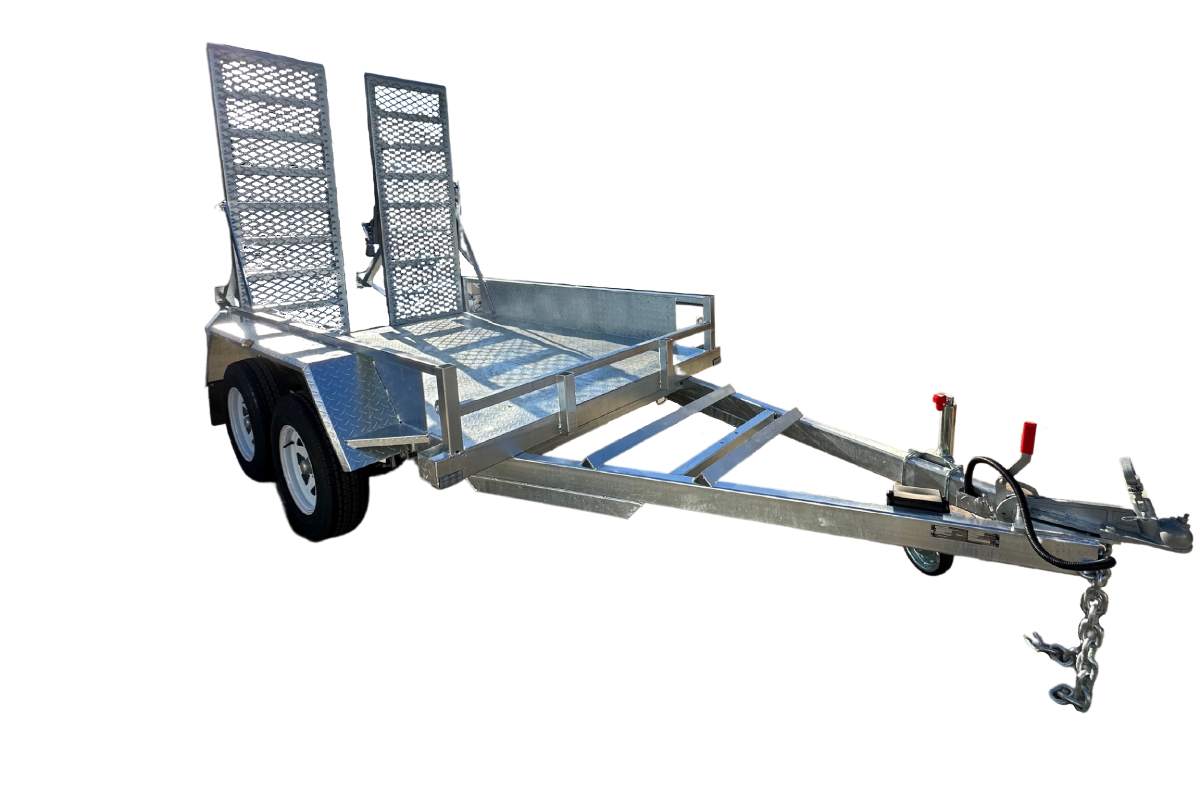Choosing the right plant trailer is crucial for anyone in the construction, landscaping, or agricultural industries. The trailer must be durable, functional, and suitable for transporting heavy machinery and equipment.
A common debate among buyers is whether to go for a steel or aluminium plant trailer. Each material has distinct advantages and drawbacks, depending on the specific use case.
This article explores the pros and cons of aluminium and steel plant trailers to help you make an informed decision.
- What is a Diesel Particulate Filter (DPF) and Why is it Important in Mining Machinery?
- How to Change a Spare Tyre and How Long Can It Last?
- Wallpaper vs. Paint: Which Choice is Better for Your Home?
Overview of Aluminium and Steel Plant Trailers
Plant trailers are heavy-duty trailers designed to transport machinery such as excavators, loaders, or farming equipment. Their construction materials significantly impact their durability, weight capacity, maintenance requirements, and cost.
- Aluminium trailers are lightweight, corrosion-resistant, and require less maintenance. They are favoured for long-term use in non-abrasive environments.
- Steel trailers are stronger, more durable, and better suited for extreme loads and rough terrains. However, they may require more maintenance to prevent rust and corrosion.
Key Factors to Consider
When choosing between aluminium and steel, consider the following factors:
Weight and Payload Capacity
- Aluminium: aluminium plant trailers are lighter than steel, which reduces the overall towing weight. This is especially beneficial if you frequently transport equipment over long distances, as it can improve fuel efficiency and reduce strain on the towing vehicle. However, aluminium has a lower tensile strength compared to steel, limiting its capacity for extremely heavy loads.
- Steel: Steel is much heavier but offers superior strength and load-bearing capacity. If you’re hauling extremely heavy machinery, a steel trailer is often the better option as it provides greater stability and durability under pressure.
Durability and Longevity
- Aluminium: Aluminium is naturally resistant to rust and corrosion, making it an excellent choice for use in areas with high humidity or exposure to saltwater, such as coastal regions. It also requires minimal maintenance, making it a durable option for general use.
- Steel: Steel trailers, while more robust, are prone to rust if not adequately maintained. Galvanized steel trailers are an option to improve corrosion resistance, but they require regular inspections and care to maintain their condition.
Maintenance
- Aluminium: aluminium plant trailers require less maintenance due to their resistance to environmental elements. Regular cleaning and occasional checks are typically sufficient.
- Steel: Steel trailers need regular maintenance to prevent rust and structural degradation, particularly if exposed to harsh weather conditions or road salts. Painting or powder-coating the steel can extend its lifespan.
Cost
- Aluminium: aluminium plant trailers are generally more expensive upfront due to the material’s manufacturing costs. However, their lower maintenance requirements and longer lifespan can make them cost-effective over time.
- Steel: Steel trailers are typically cheaper to purchase initially. If you’re on a tight budget, a steel trailer might be the practical choice. Keep in mind, though, that ongoing maintenance costs can add up over time.
Resale Value
- Aluminium: Aluminium trailers retain their value better because of their corrosion resistance and aesthetic appeal. If you plan to upgrade or resell the trailer in the future, aluminium might fetch a higher price.
- Steel: Steel trailers may depreciate faster, especially if they develop rust or show signs of wear. However, their robust construction can still appeal to buyers looking for heavy-duty options.
Environmental Considerations
- Aluminium: Aluminium is often considered more environmentally friendly because it can be recycled without losing its properties. The production process, however, is energy-intensive.
- Steel: Steel is also recyclable and widely used in various industries. Its durability can reduce the need for frequent replacements, contributing to sustainability.
Advantages and Disadvantages
Aluminium Plant Trailers
Advantages:
- Lightweight and fuel-efficient towing.
- Corrosion-resistant, ideal for wet or salty environments.
- Minimal maintenance is required.
- Higher resale value.
Disadvantages:
- Higher upfront cost.
- Limited load-bearing capacity compared to steel.
- More susceptible to dents and damage under impact.
Steel Plant Trailers
Advantages:
- Superior strength and load-bearing capacity.
- More affordable initial cost.
- Suitable for extreme conditions and heavy machinery.
Disadvantages:
- Prone to rust and corrosion without proper maintenance.
- Heavier, leading to reduced fuel efficiency.
- Requires regular upkeep, such as painting or rustproofing.
Practical Scenarios
When to Choose Aluminium
- You operate in coastal areas or regions with high humidity.
- Your primary concern is fuel efficiency and ease of towing.
- You frequently transport lighter or medium-weight machinery.
- You prefer low-maintenance equipment with high resale value.
When to Choose Steel
- You work in construction sites with rough terrains.
- You need to transport extremely heavy or oversized equipment.
- You’re operating on a limited budget but require a robust solution.
- You don’t mind investing time and effort in maintenance.
Additional Features to Consider
When choosing a plant trailer, material is just one aspect. Pay attention to features such as:
- Braking Systems: Ensure the trailer has adequate braking mechanisms for safe towing.
- Suspension: A good suspension system minimizes wear and tear on the trailer and equipment.
- Loading Ramps: Look for durable and user-friendly ramps to ease loading and unloading. SureWeld manufactures high-quality loading ramps that are both durable and efficient.
- Tyres and Wheels: Heavy-duty tyres are essential for handling different terrains.
Combining Aluminium and Steel
Some manufacturers combine aluminium and steel to leverage the benefits of both materials. For instance:
- The frame might be made of steel for structural strength.
- The body or panels might be made of aluminium to reduce weight and prevent corrosion.
These hybrid trailers can be an excellent middle-ground solution, offering durability without the excessive weight of a full-steel construction.
Conclusion
Both aluminium and steel plant trailers have unique advantages that cater to different needs. Aluminium trailers are ideal for those prioritizing lightweight, low-maintenance options, especially in corrosive environments. Steel trailers, on the other hand, are the go-to choice for heavy-duty applications and extreme conditions.
To make the best decision, assess your specific requirements, budget, and long-term goals. Additionally, consult with reputable manufacturers like SureWeld to ensure you get a quality product tailored to your needs. By considering these factors, you’ll be well-equipped to choose the perfect plant trailer for your operations.

